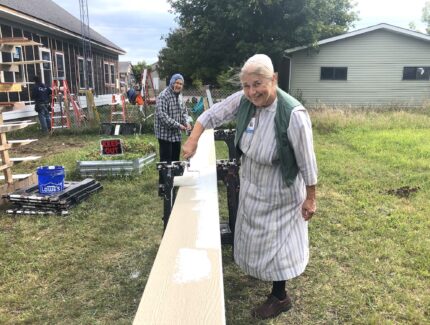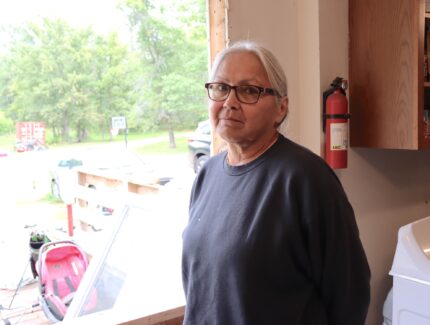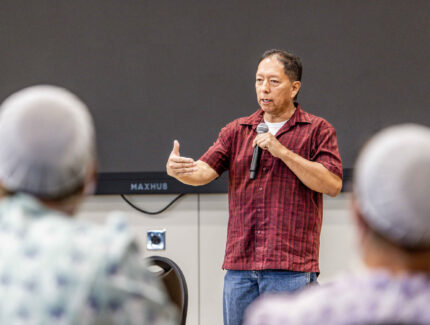
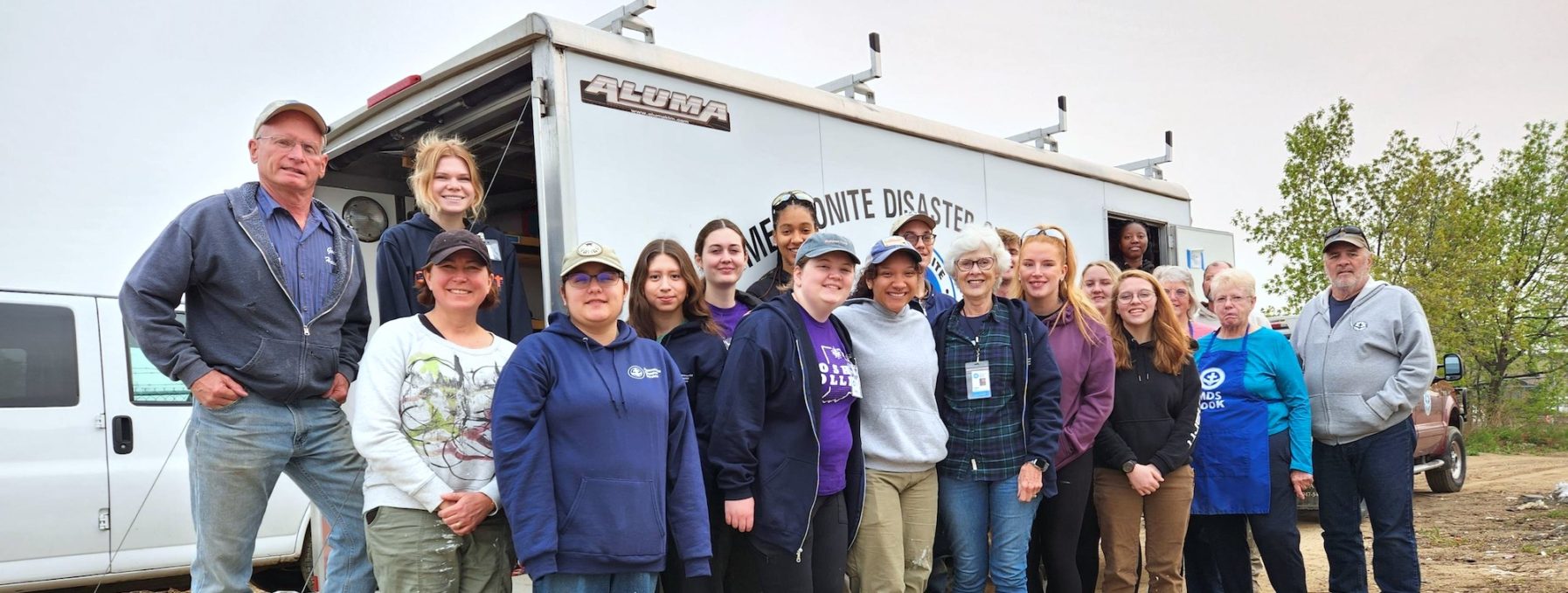
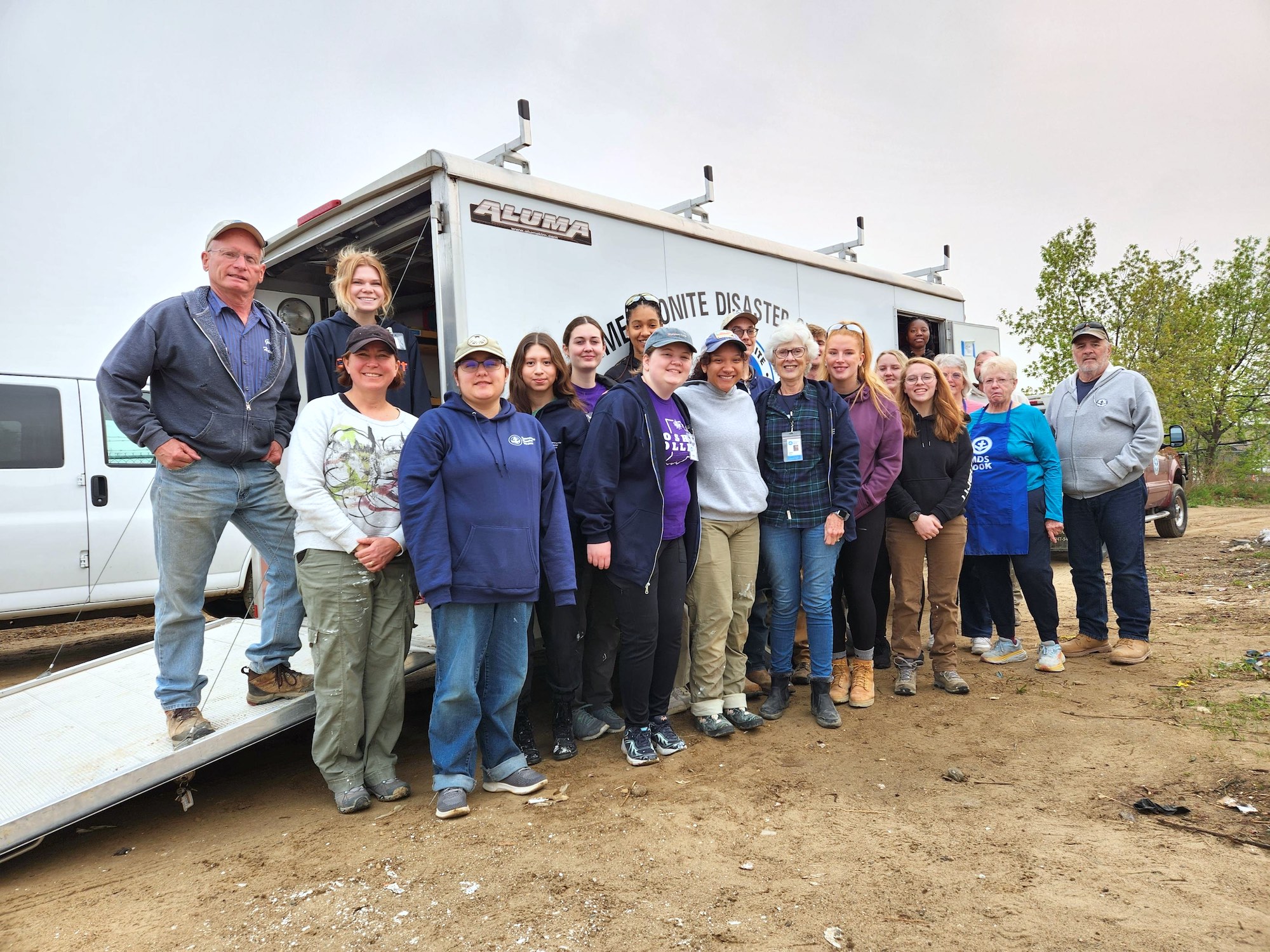
May 24, 2023
Goshen College students help MDS get started in Red Lake
Learn about Native American history, culture, ceremonies
“They’re doing a great job!”
That’s what Edith Carr, Office Manager with the MDS response in Red Lake, MN, said of the 11 Goshen College students who spent two weeks in May helping convert an old grocery store into a base camp for the organization. “Soon this place will be ready to receive volunteers.”
The students, part of the College’s Environmental Disaster and Response course, were in the northern Minnesota community—called Miskwaagamiiwi-zaaga’iganing in Ojibwe—to help MDS get ready to receive volunteers who will be coming this summer to repair homes damaged by a tornado in 2021.

They were welcomed by Robert Neadeau, the Director of Emergency Services for the reservation of about 8,000 people. He had only been in his job for three months when the tornado hit.
“The hail was as big as a softball,” he said, adding that the hail, together with the wind, damaged roofs and siding and broke windows.
Neadeau was able to secure some funding from the U.S. government and from Lutheran Social Services to get started on repairs. But he struck out when looking for volunteers to fix the damaged houses. That’s when MDS became involved.
The invitation came in a roundabout way, said Jeff Koller, MDS Region Three Operations Coordinator. “But once we went to Red Lake and met Robert, we knew we should play a role,” he said.

The project, which is supported by the MDS Minnesota Unit, got started in February when small groups of volunteers came from Kansas, Missouri, Minnesota, South Dakota and Iowa to start preparing the old grocery store to become the new center of operations. This included some Amish volunteers from Missouri, who framed out the bedrooms and hung the drywall.
For Neadeau, who had never heard about Mennonites before, MDS’s involvement seemed miraculous. “Creator works in mysterious ways, Neadeau said. “It’s all in Creator’s timing.”
Cross-cultural experience through MDS
During their time in Red Lake, the students sanded, painted, built bunk beds, laid carpet and did plumbing and electrical work to make it a home-away-from-home for the volunteers who would follow them.
The group was led by Kendra Yoder, who teaches sociology and women’s and gender studies at the College. For her, MDS fills an important need for the school.
“Not all of our students can go overseas for a semester due to cost, time, or documentation issues,” she said of how the College traditionally has sent students to other countries for service and cross-cultural learning experiences. “We knew we needed more shorter-term domestic options. That’s where MDS comes in.”
Through MDS, students can learn about other cultures closer to home, she said, noting previous groups served with the organization in Florida and Texas.
I treasure the relationship that has developed between MDS and Goshen College.
— Jeff Koller, MDS Region Three Operations Coordinator
“They don’t have to go to another country to do that,” Yoder said. “They can cross cultures through MDS right here in the U.S.”
Cameron Comadoll is one of those students. For the 21-year-old nursing student, the trip is a way to “learn more about Native American culture.”
One special experience was being attending a pow wow on the reservation. “None of us had ever been to one before,” she said. “It was a real privilege to be invited.”

For Katie Bollander, 19 and also a nursing student, the trip was an opportunity to learn things about Native Americans she didn’t encounter in high school history classes.
“We learned about the settlers and how the land was settled, but not much about the people who lived here before they came,” she said.
It was the same for Regan Sheipline, 22, who is studying education. “We barely touched on it,” she said her experience in high school when it came to Native American history.
Through the course and experience in Red Lake she has learned more about Native American customs and ceremonies and how they see the world. The time spent in Red Lake “will make me a better teacher,” she added.
Although the students didn’t get a chance to work on homes and meet homeowners, they felt positive about their contribution to the MDS response in the community.
“We may not have worked on homes, but we were part of the bigger cause by helping to create the place where volunteers will stay,” said Sheipline. “That’s our way of helping the community.”
For Koller, it was an important role.
“The students make a valuable contribution to our response in Red Lake,” he said, noting their work will make it possible for MDS to repair as many as 60 homes on the reservation. “I treasure the relationship that has developed between MDS and Goshen College.”

Glenn Giessinger, Chair of the MDS Minnesota Unit, agreed. “I am absolutely pleased by the work of the students,” he said. “Their work helped make this project possible.”
Or, as Carr put it, “because of them, a tremendous amount of work was done.”
John Longhurst, MDS Canada Communications

